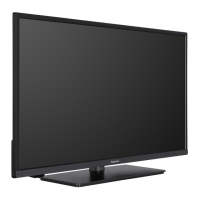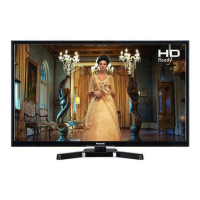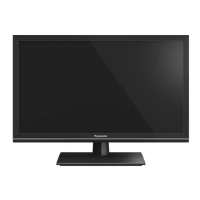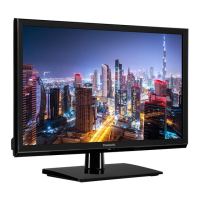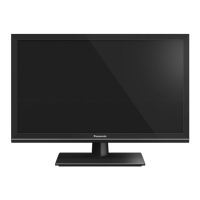Do you have a question about the Panasonic TX-24MS480B and is the answer not in the manual?
Crucial instructions to follow before initial setup and use of the TV.
Explanation of symbols and markings found on the television for safety and operational guidance.
Essential safety precautions and guidelines for securely mounting the TV on a wall.
Precautions to prevent the TV from falling, causing injury, especially to children.
Instructions for cleaning the TV's display panel, cabinet, pedestal, and mains plug.
Step-by-step guide on how to attach the TV stand to the television screen.
Welcome message and essential information for new TV owners to ensure safe and correct operation.
List of items provided with the TV, such as remote control, batteries, and instruction book.
Highlights of the TV's main capabilities and functionalities, including Android OS and connectivity.
Guide on connecting satellite or aerial TV plugs to the appropriate sockets on the TV's rear.
Details on connecting various external devices via YPbPr, HDMI, VGA, SPDIF, AV, USB, and CI interfaces.
Instructions for switching the TV on, off, and into standby modes using the remote and control switch.
Guidance on using the TV's control switch, remote control, and input selection for basic operations.
Detailed explanation of each button on the remote control and its specific function.
Steps for inserting batteries into the remote and pairing it with the TV for initial use.
Initial steps to select the TV's language and proceed with the setup wizard.
Configuring network connection and signing into a Google account for full TV functionality.
Setting TV location, country, and selecting the appropriate tuner mode for channel scanning.
Detailed steps for configuring and performing channel scans for satellite and cable broadcast types.
Setting up satellite parameters, loading preset lists, and performing channel scans.
Introduction to the Home Screen interface and how to navigate through apps and content.
Guide to accessing apps, content, and settings from the TV's main Home Screen interface.
Accessing Live TV menus, managing channels, and adding favourites for quick access.
Overview of TV Options, including Picture, Sound, Power, and Advanced settings for customization.
Configuring channel installation modes, scanning, and managing channel lists.
Customizing subtitle display, language preferences, and accessing teletext services.
Managing network connections, Wi-Fi settings, and accessing system information.
Detailed steps for connecting to Wi-Fi or Ethernet networks and configuring network options.
Performing automatic and manual channel searches for antenna reception, including scan types.
Managing channel lists through skipping, swapping, moving, and editing channel information.
Procedures for installing and scanning channels for cable broadcasting types.
Advanced settings for satellite reception, including manual tuning and adding satellites.
Setting up parental controls, blocking channels, and managing PIN for restricted content access.
Managing Google accounts and installed apps, including permissions and security restrictions.
Configuring device preferences like date/time, timers, and language for optimal TV operation.
Customizing picture quality through various modes, brightness, contrast, and sharpness settings.
Utilizing features like Dynamic Noise Reduction (DNR) and MPEG Noise Reduction for improved video quality.
Fine-tuning video settings like Adaptive Luma Control, DI Film Mode, Blue Stretch, and Game/PC modes.
Adjusting sound settings, styles, volume balance, and output options for optimal audio experience.
Managing sound storage, disabling auto power off, and adjusting volume commentary.
Adding and managing Bluetooth devices like remotes, headphones, and controllers for enhanced TV interaction.
Browsing, editing, and managing favourite channels within the TV's channel list interface.
Accessing and using the EPG to view TV schedules, search for programs, and access catch-up services.
Utilizing Freeview Play to access on-demand content and catch-up TV services directly from the guide.
Instructions for connecting the TV to a broadband internet connection via Ethernet or Wi-Fi.
Guide to launching the Multi Media Player, selecting media types, and navigating video, music, and photo files.
Using playback controls for video and music files, including play, pause, rewind, and fast forward functions.
Configuring the TV as a digital photo frame, setting slide show intervals, rotations, and effects.
Instructions for playing media files from a connected USB storage device, including file format support.
Sharing media content from mobile devices via DMR and using Google Cast for wireless streaming.
Enabling and using HDMI CEC to control connected devices with the TV remote for seamless interaction.
Understanding HbbTV for hybrid broadcast and broadband TV services, interactive features, and applications.
Guidelines for using Freeview Play, including internet connection and terms agreement for catch-up services.
Automatic channel searching performed by the TV while in quick standby mode.
Instructions for updating the TV's firmware via the internet to ensure optimal performance and features.
Solutions for common issues like TV not switching on, remote control unresponsiveness, and no channels.
Table detailing typical resolutions and frequencies supported via VGA input for various display modes.
Compatibility information for AV and HDMI signals, listing supported video standards and resolutions.
List of supported video codecs, resolutions, bit rates, profiles, and container formats for USB playback.
Details on supported audio codecs, sample rates, channels, bit rates, and container formats for USB playback.
Further information on supported audio codecs, sample rates, channels, bit rates, and container formats for USB playback.
List of supported image file formats and their resolutions for display on the TV.
Supported subtitle file extensions, containers, and codecs for internal subtitle display.
Supported subtitle file extensions, parsers, and remarks for external subtitle files.
Table outlining supported resolutions for DVI input when using a DVI to HDMI converter cable.
Technical details including broadcasting, voltage, power consumption, dimensions, and operating conditions.
Information on wireless LAN frequency ranges, output power, country restrictions, and security standards.
Information regarding DVB standards, service availability, and potential limitations or charges from providers.
Details on licences for HDMI, Dolby, Google, Microsoft, and other third-party software used in the product.
Guidelines for environmentally responsible disposal of old TV units and batteries within the EU.
Official declarations confirming the TV's compliance with EU and UK regulations and standards.
Details for contacting customer support, accessing online resources, and ordering accessories.
Crucial safety instructions for connecting the TV to the mains power supply, including wire colour coding.
| Screen Size | 24 inches |
|---|---|
| Resolution | 1366 x 768 pixels |
| Display Type | LED |
| Smart TV | Yes |
| HDMI Ports | 2 |
| USB Ports | 1 |
| Audio Output | 10 W |
| Built-in Wi-Fi | Yes |
